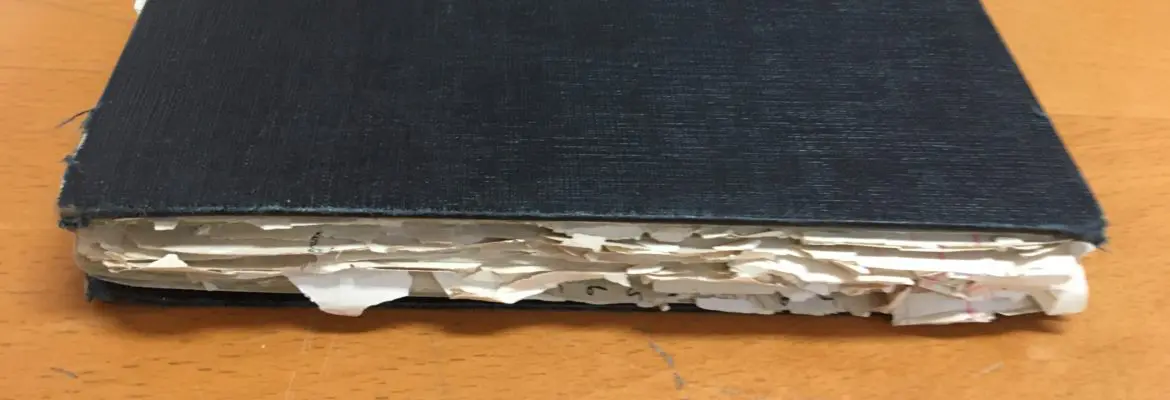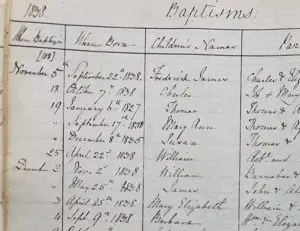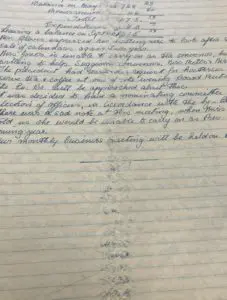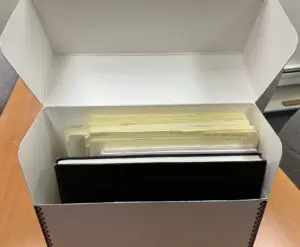
Archives & Conservation – Preservation in the Parish
In April 2022 the Archives received a Documentary Heritage Communities Program (DHCP) grant from Library and Archives Canada to conduct conservation work on 25 of our registers that are in fragile condition. We’d like to share some information about preservation, conservation, and the work we’re doing to ensure the safe long-term storage and access to parish registers. This week we are going to provide information on preservation of records at the parish.
Why is preservation important?

Much of the archival material at the Diocese of Toronto Archives comes from the many congregations within our boundaries. Parish registers containing baptisms, confirmations, marriages and burials are among the most important records created by a congregation or parish. Records prior to 1869 may be the only record of the event as civil registration wasn’t mandatory until 1869. However, records after this date are also invaluable.
A baptism record may be needed if a birth wasn’t registered with the government, to confirm the spelling of a name or date of birth, or in the event that the individual has been asked to be a Godparent. A marriage record may be needed to apply for a passport or other photo ID, to prove a change of name, or to be able to collect a survivor’s pension.
If these and other records are being kept at the church, it’s important to ensure the preservation of the records to allow for ongoing access to these permanent records.
How can parishes help preserve records?
As mentioned last week one of the best ways to ensure the preservation of records is to provide a stable environment and proper supplies and equipment for storage.

As with all types of media that contain valuable information, paper shouldn’t be stored in bell towers, attics, basements, or places where mold and mildew may develop or already be present. They should be stored in a dry, clean area where air circulates and where the records will not be exposed to excessive light. Temperature and humidity should be at constant levels, preferably around 20-21°C (68-70°F) and 40-50% relative humidity (RH).
Records should be stored off the floor to help prevent against water damage, in the event of a flood. They should also be stored on metal shelves or sealed wooden shelves to help prevent against exposure to insects that might make their homes in untreated wood.

The records should be kept in a clean box with lid to help protect against dust and moisture. They should also be given adequate space and not tightly packed, whether kept in file cabinets, or clean boxes. Discard duplicates and drafts, so only a single final version is kept permanently.
At your parish, you might notice that some of your records already display signs of physical damage. If your records are showing signs of damage or deterioration you should contact us as soon as possible to arrange to transfer them to the Diocesan Archives. This will ensure that they’re kept in a climate controlled environment and that they’ll be included in our conservation planning.
Alternatively, you can contact a reputable conservator through the Canadian Association of Professional Conservators and seek to have the conservation work completed professionally. It is imperative that you do not attempt to fix damage or tears on your own, as this can end up with additional damage being caused over the long term. Even supplies marketed as “archives safe” or “archives quality” may not necessarily be safe or appropriate for completing necessary repairs.
What should we keep?
Archives exist to arrange, describe, preserve, and make available records of enduring value. The phrase “records of enduring value” can be confusing, and it is sometimes difficult for parishes to discern which records are deemed archival and must be kept permanently. Records that should be kept permanently for archival purposes include:
- Parish Registers
- Significant correspondence
- Vestry and committee minutes
- Legal documents including insurance policies
- Annual reports including financial statements
- General Ledgers
- Newsletters
- Records of organizations (A.C.W, Altar Guild etc.)
- Architectural drawings
- Pew bulletins for significant events
- Photographs of events with individuals and the events identified on the back
So far, the focus of this series of blog posts has been on textual records. Care should also be taken with photographs and other audio-visual (AV) materials. Information on preservation and conservation of AV materials will be covered in a later post in this series.